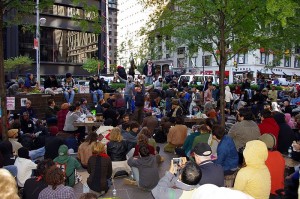social networking

Facebook, with its nearly 500 million users, connects us to the world around us and we are able to share everything from vacation pictures to memorial pages for those who have died. The site has moved past its original intent of social networking between friends; businesses, churches, civil groups, clubs, and even TV shows all have a presence on Facebook. Breaking news is reported, shared, liked and commented on, all within the confines of one website. The goal has moved from friendly conversations to specific advertisements and mass information around like issues, causes, and beliefs.
But what has Facebook done for Christianity? Has it helped or hurt the Gospel message? Recently I began to see more and more pictures shared that read “Like if you Love Jesus” or “Keep scrolling if you love the Devil, like if you love God.” These pictures call for Christians around the world to share their faith boldly and proudly on their Facebook page so that all who may grace it will know that they are a follower of Christ.
To be honest, I can’t stand them.

A tech writer’s obituary for PCWorld’s print magazine — part tongue-in-cheek, part nostalgia riff — reminded me that I once devoured that magazine, now kaput.
It was an early lens into the fascinating world of personal computing. Its ads and articles stoked dreams of power and speed.
I soon became part of PCWorld’s dilemma. I dropped the print mag and began seeking tech news on the Internet. It was faster and fresher, had clickable links to other sites, great art, and brevity. PCWorld itself went online.
Much of my world has switched to the Internet. I do most of my banking and bill paying online, shop online, order lunch online, learn choir music online, teach classes online, use email and text messaging extensively, and read the news online.
Nothing unusual in any of that. Such web-centered behavior has become the new normal. Any enterprise that isn’t considering ways to move its operations online is losing its future.
In my world, more and more churches are going web. Electronic newsletters replace mailed paper. Clergy use email to communicate, as do staff and volunteers. Tweets, Facebook posts, e-blasts, and text messages carry word of emergencies. Constituents make donations online.
There’s more. Classes are moving online, as are interviews with job candidates and opinion surveys. Some congregations are experimenting with worship online and small groups. Every Sunday morning, some 600,000 people a minute access Bible verses online using one app.
We've compiled a list of links where you can learn more about the genesis of the #OccupyWallStreet movement, including links to news reports, organizations involved in formenting the movement and local groups in every state where you can get involved close to home (if you don't live in Lower Manhattan.)
